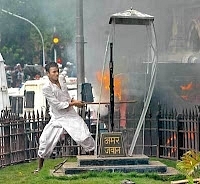
A few questions on Mumbai riots
No pontification, no opinion, only a few questions on Mumbai riots.
On the 65th anniversary of the founding of modern India, the people were greeted by unexpected violence in Mumbai. A grim reminder of India’s ghost that has haunted it since 1947. A unrecognised radical Islamist organisation called the Raza Academy which promotes radical Islam organised a rally at Azad Maidan in Mumbai to protest the deaths of illegal Bangladeshi Muslim intruders in Assam and ethnic riots affecting Rohingya Muslims in Burma.
The protest (Mumbai) had socio-politico connotations. Were the protest organisers trying to pass a message to the rest of India? What was this message?
Some questions that beg answers:
1) Why should Indian Muslims, who are citizens of India, be bothered by a communal flare up in Assam between fellow Indian citizens and illegal Bangladeshi Muslim intruders? Concern at a humanitarian level is understandable, but then why was the protest restricted to condone the deaths of illegal Bangladeshi Muslims and Burmese Muslims alone, and not extended to fellow Indian citizens? The protest had political connotations. Were the protest organisers trying to pass a message to the rest of India? What was this message? Is the ‘Ummah’ greater than the nation, the land that sustains?
What did these riots and subsequent unfortunate deaths achieve for the illegal Bangladeshis and the Rohingya Muslims, besides damaging further the image of the Indian Muslims?
2) Why should Indian Muslims, who are citizens of India, be bothered by ethnic riots in distant Burma? Why should events unfolding in Burma lead to street battles with Indian police, molestation of women constables, attacks on women passengers in trains and other Indian citizens, resulting in deaths and injuries not to mention destruction of public property. What did these riots and subsequent unfortunate deaths achieve for the illegal Bangladeshis and the Rohingya Muslims, besides damaging further the image of the Indian Muslims?
3) Did these Muslim organisations organise a similar rally to protest the death of Indian citizens in Kashmir, especially when Kashmiri Pandits were massacred and chased out of Kashmir? Is it because the killers are Muslims?
4) If the movement was driven by humanitarian concerns, then why did these Muslim organisations not organise a similar rally to protest deaths and massacres of Muslims in Syria? Is it because the killers are Muslims?
Why was the Mumbai protest rally not made secular by including Hindus, Sikhs, Buddhist and Christians into the fold?
5) If humanitarian crisis in Assam or distant Burma is a concern, then why did these Muslim organisations not organise a similar rally to protest kidnapping, rape, oppression and forced conversion of Hindus in Pakistan. After all, Hindus are humans too and a huge percentage of their fellow citizens are Hindus in India.
6) The anti-corruption movement of Anna Hazare and Baba Ramdev has been attacked for not being secular enough i.e. Muslims were not included in the brain trust, in its organisation or leadership, prompting a change. Why was the Mumbai protest rally not made secular by including Hindus, Sikhs, Buddhist and Christians into the fold?
Evidently this is a case of Friday morning brainwashing with half-baked logic…
7) Some Muslims retorted in anger that the Govt. of India was vociferous in condemning attack on a Sikh Gurudwara in the USA but not in the case of Muslim deaths in Assam or Burma. Evidently, this is a case of Friday morning brainwashing with half-baked logic. The Sikhs who were killed in USA were, or are, Indian citizens (and in some cases NRIs). With respect to Assam or Burma, the people killed are not Indian citizens. At any rate, a unresponsive Indian govt. does not merit a street battle with the police and fellow citizens. India is a democracy and the offending party can be voted out.
…does a parallel nation exist within India?
8) What was the mood and the mindset that led to the attack on the state police, burning of public property and vandalising of the memorial to the anonymous soldier. Is public property and buses not serving us all? Do the bus driver and conductor discriminate while issuing tickets? Did the anonymous solider whose memorial was vandalised not defend us all selflessly? Does it not all belong to us, is it not all Indian or does a parallel nation exist within India?
9) Do the events of the 12th of August lead us to believe that in the event of an Indo-Pak conflict, which may lead to collateral damage of Pakistani civilians, the Indian Muslim organisations would stage similar or worse violent protest against the Indian govt, the law and order machinery and the nation at large?
These are a few questions that come to mind, never mind all the deviousness of the Indian media which is trying to divert attention from the core subject by blaming Pakistan or a few radicals who started the fire. If these were few radicals and the crowd was peaceful, then why did the entire crowd erupt in violence? Lets be honest, the intentions were never peaceful. In fact, this protest rally was utterly pointless and was far from what it really was intended for. If India wants to find a solution to this problem then it lies not in pseudo-secularism and appeasement, but by erasing the parallel nation that our politicians have allowed to take root.